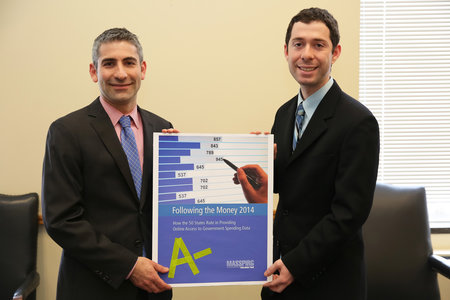New Report: Massachusetts Receives an “A-” in Annual Report on Transparency of Government Spending
Contact: Andrew Fish, Program Associate, MASSPIRG
Office: (617) 747-4383
Cell: (434) 466-7824
Email: [email protected]
Boston, April 8 – Massachusetts received an A- when it comes to government spending transparency, according to “Following the Money 2014: How the 50 States Rate in Providing Online Access to Government Spending Data,” the fifth annual report of its kind by the MASSPIRG Education Fund.

Pictured above: Secretary of Administration and Finance Glen Shor (left) and Andrew Fish, Program Associate with the MASSPIRG Edcuation Fund (right).
“Massachusetts continues to lead the states in making government spending more transparent and accessible,” said Andrew Fish, Program Associate with the MASSPIRG Education Fund. “Providing comprehensive and meaningful information about where public money goes provides citizens with the information they need to hold elected officials and recipients of public subsidies accountable.”
“We have worked hard to make state government more transparent for taxpayers, and this superb grade from MASSPIRG reflects that,” said Secretary of Administration and Finance Glen Shor. “We have expanded the Commonwealth’s Open Checkbook website to include information on Quasi-Public Authority expenditures and published a report on the Economic Development Incentive Program, detailing jobs retained and created in the state, all in an effort for residents to see just how their tax dollars are being spent.”
Officials from Massachusetts and 44 other states provided our researchers with feedback on their initial evaluation of state transparency websites. Massachusetts was among the 8 “Leading states” with the most comprehensive transparency websites. The other 7 include: Indiana, Florida, Oregon, Florida, Texas, Iowa, Vermont, and Wisconsin.
Based on an inventory of the content and ease-of-use of states’ transparency websites, the “Following the Money 2014” report assigns each state a grade of “A” to “F.” Described in the report as a “Leading state,” Massachusetts has created a user-friendly website, “Informed Massachusetts,” that provides visitors with accessible information on an array of expenditures. Leading states also provide visitors with recipient-specific information on subsidy awards, and allow users to download and analyze the entire checkbook dataset.
This is the third consecutive year in which the transparency website has earned an “A-“.
“Given that our grading standards rise annually, earning an A- each year means Massachusetts has demonstrated a significant commitment toward transparency and is continually investing in improvements,” said Fish. “However, there is room for improvement. All tax expenditure programs should include detailed recipient level information. While the state has disclosed this information for the Economic Development Incentive Program, it is not available for other programs like the Film Tax Credit and Investment Tax Credit. Making this information available for some expenditure programs may require legislative or other changes to the way the program is administered.”
Six states provide public access to checkbook-level data on the subsidy recipients for each of the state’s most important economic development programs, allowing citizens and public officials to hold subsidy recipients accountable by listing the public benefits that specific companies were expected to provide and showing the benefits they actually delivered. The most transparent states also provide detailed information on “off-budget” quasi-public agencies. The Massachusetts website includes spending information from several quasi-public agencies and the administration has plans to expand the number of agencies included.
In addition, Massachusetts is working with cities and towns to post their spending on the transparency website. Massachusetts has awarded more than $300,000 in Community Innovative Challenge (CIC) grants to six cities to post their spending information online. One of these cities, Woburn, is encouraging other cities that did not receive a CIC grant to use its model and post their spending information on the Massachusetts’ transparency website as well. In total, Massachusetts and Woburn plan to help 20 cities post their spending information online by January 2015.
States that have created or improved their online transparency have typically done so with little upfront cost. In fact, top-flight transparency websites can save money for taxpayers, while also restoring public confidence in government and preventing misspending and pay-to-play contracts.
State spending transparency appears to be a non-partisan issue. The report compared transparency scores with various measures of state legislative, gubernatorial or public opinion partisanship and found that neither Republican nor Democratic states tended to have higher levels of spending disclosure.
The state’s transparency website, “Informed Massachusetts,” is operated by the Massachusetts Executive Office for Administration and Finance.
Read the report: “Following the Money 2014: How the 50 States Rate in Providing Online Access to Government Spending Data.”
# # #
MASSPIRG Education Fund works to protect consumers and promote good government. We investigate problems, craft solutions, educate the public, and offer meaningful opportunities for civic participation. www.masspirgedfund.org